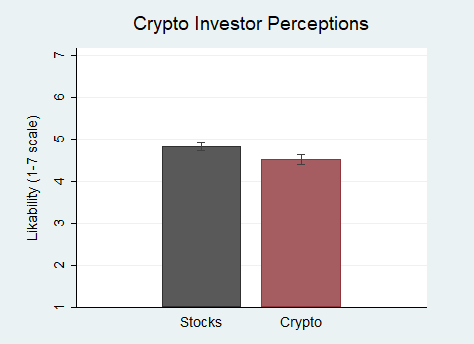Overview
Few areas of the finance industry have attracted as much fanfare as cryptocurrency. Affectionately coined “crypto,” many fans of financial technology ("Fintech") have become enamored with blockchain-driven cryptocurrencies like Bitcoin, Ethereum, and Dogecoin.
To fans, crypto is the greatest thing since sliced bread stocks. Others just want to stop hearing about it. The over-enthusiasm by some in the crypto community have attracted euphemisms like “crypto bro.” But such is also the case in the investing world more generally, with terms like “finance bro.”
So we wondered, are crypto fans perceived more harshly than classic fans of investing? Of course, we put it to the test.
The Experiment
We had 400 people on Amazon Mechanical Turk participate in a hypothetical scenario in which a new co-worker mentions his passion for crypto or traditional stock investing (randomly assigned). We then asked these participants how much they liked this new co-worker.
Participants were told the following:
Few areas of the finance industry have attracted as much fanfare as cryptocurrency. Affectionately coined “crypto,” many fans of financial technology ("Fintech") have become enamored with blockchain-driven cryptocurrencies like Bitcoin, Ethereum, and Dogecoin.
To fans, crypto is the greatest thing since sliced bread stocks. Others just want to stop hearing about it. The over-enthusiasm by some in the crypto community have attracted euphemisms like “crypto bro.” But such is also the case in the investing world more generally, with terms like “finance bro.”
So we wondered, are crypto fans perceived more harshly than classic fans of investing? Of course, we put it to the test.
The Experiment
We had 400 people on Amazon Mechanical Turk participate in a hypothetical scenario in which a new co-worker mentions his passion for crypto or traditional stock investing (randomly assigned). We then asked these participants how much they liked this new co-worker.
Participants were told the following:
A new co-worker is starting a conversation with you about hobbies, and he mentions that he’s a big fan of [the stock market (investing in companies like Boeing and Express) / crypto (investing in cryptocurrencies like Bitcoin and Ethereum)]. He then proceeds to tell you about how to invest in [the stock market / crypto].
Participants were then asked, “How much do you like this person? (1 = Not at all, 7 = Very much)” using a 1-7 scale.
Results
An independent samples t-test revealed that participants liked our hypothetical crypto fan (avg. = 4.53) less than our traditional investing fan (avg. = 4.84), (p = 0.041). And this difference didn’t seem to be affected by gender (p = 0.687) or age (p = 0.983). However, the difference was quite small, only about a fifth of a standard deviation, which is a bit smaller than most of the statistically significant differences we find.
Results
An independent samples t-test revealed that participants liked our hypothetical crypto fan (avg. = 4.53) less than our traditional investing fan (avg. = 4.84), (p = 0.041). And this difference didn’t seem to be affected by gender (p = 0.687) or age (p = 0.983). However, the difference was quite small, only about a fifth of a standard deviation, which is a bit smaller than most of the statistically significant differences we find.
Conclusion
If you’re a crypto-evangelist, you may incur a small social loss when trying to persuade others to buy into blockchain. But crypto is relatively new, not to mention volatile. It will be interesting to see how this perception changes over the next several years.
Methods Note
We used an independent samples t-test to test for significant differences in perceptions between our two experimental conditions. For significant differences, the difference between the two groups' averages would be large and its corresponding “p-value” would be small. If the p-value is less than 0.05, we consider the difference statistically significant, meaning we'd likely find a similar effect if we ran the study again with this population. To test for significant interactions between the main results and participant demographics, we used OLS regression analyses with interaction terms.
Methods Note
We used an independent samples t-test to test for significant differences in perceptions between our two experimental conditions. For significant differences, the difference between the two groups' averages would be large and its corresponding “p-value” would be small. If the p-value is less than 0.05, we consider the difference statistically significant, meaning we'd likely find a similar effect if we ran the study again with this population. To test for significant interactions between the main results and participant demographics, we used OLS regression analyses with interaction terms.
Popular Experiments
COVID MasksDoes wearing a COVID mask affect how others think of you?
|
Video GamesAre video games more enjoyable than board games?
Does age or gender matter? |
Zero-Sum PoliticsDo Democrats or Republicans view society as win-lose?
|




